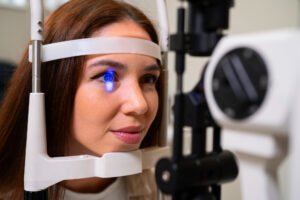Overview
Proteinuria is the presence of excess protein in the urine, which may indicate kidney dysfunction or other systemic conditions. Under normal circumstances, urine contains minimal protein, as healthy kidneys prevent large amounts of protein from passing through the filtration system. Persistent proteinuria is a key marker for kidney disease, and early detection is crucial to prevent progression to chronic kidney disease (CKD) or other complications.
In Korea, nephrology clinics and hospitals offer advanced diagnostic tests, monitoring, and treatment for proteinuria. Early recognition and management ensure preservation of kidney function and overall health.
➤ Excess protein in urine, often detected via urine test
➤ Can indicate underlying kidney or systemic disorders
➤ Early detection is vital to prevent long-term complications
Key Facts
➤ Proteinuria can be transient or persistent, and causes range from benign to serious.
➤ Common causes include kidney disease, diabetes, high blood pressure, infections, and medications.
➤ In Korea, urine dipstick tests, 24-hour urine collection, and lab analyses are commonly used for detection.
➤ Persistent proteinuria may lead to chronic kidney disease (CKD) or nephrotic syndrome if untreated.
➤ Early management improves renal outcomes and prevents complications such as edema, hypertension, and cardiovascular risk.
What Is Proteinuria?
Proteinuria refers to the abnormal presence of proteins—primarily albumin—in the urine. Proteins are essential for body function and are normally retained in the blood by the kidneys. Proteinuria can be categorized as:
➤ Transient Proteinuria
➤ Temporary increase in urine protein, often caused by stress, exercise, fever, or dehydration.
➤ Usually resolves spontaneously without treatment.
➤ Persistent Proteinuria
➤ Continuous presence of protein in urine, which may indicate chronic kidney disease or systemic illness.
➤ Requires further evaluation and management.
➤ Nephrotic Range Proteinuria
➤ Very high levels of protein in urine (usually >3.5 g/day).
➤ Associated with nephrotic syndrome, severe kidney damage, or systemic conditions.
What Symptoms Are Related To
Proteinuria is often asymptomatic, especially in early stages. However, associated symptoms may appear depending on underlying causes:
➤ Foamy or frothy urine
➤ Swelling (edema) in hands, feet, or face
➤ Fatigue or weakness due to protein loss and associated anemia
➤ High blood pressure
➤ Reduced urine output in severe kidney disease
➤ Weight gain from fluid retention
➤ Frequent urination or nocturia if linked to diabetes or kidney dysfunction
Recognition of these symptoms, combined with routine urine tests, is essential for timely diagnosis.
What Causes / Possible Causes
Proteinuria can result from kidney-specific, systemic, or transient conditions:
➤ Kidney-Specific Causes
➤ Glomerulonephritis: Inflammation of the kidney’s filtering units
➤ Diabetic nephropathy: Kidney damage due to chronic high blood sugar
➤ Hypertensive nephropathy: High blood pressure damaging renal filtration
➤ Polycystic kidney disease or other structural abnormalities
➤ Systemic Causes
➤ Diabetes mellitus leading to kidney injury
➤ Heart failure causing fluid retention and renal stress
➤ Autoimmune diseases such as lupus nephritis
➤ Infections (e.g., urinary tract infections, sepsis)
➤ Transient or Benign Causes
➤ Fever, dehydration, or strenuous exercise
➤ Stress-related protein excretion
➤ Medication-Induced Proteinuria
➤ Certain NSAIDs, antibiotics, or chemotherapy drugs may cause temporary kidney stress
When Should I See My Doctor
Seek medical evaluation if:
➤ Foamy or frothy urine persists
➤ Swelling in hands, feet, or around the eyes
➤ Fatigue, weakness, or unexplained weight gain
➤ High blood pressure or changes in urination
➤ Proteinuria is detected on routine urine tests or during health check-ups
Early evaluation ensures identification of kidney disease, prevention of progression, and timely treatment.
Care and Treatment
Management of proteinuria depends on the underlying cause, severity, and associated conditions:
➤ Lifestyle and Home Care
➤ Maintain healthy blood pressure and blood sugar levels
➤ Reduce salt intake to manage fluid retention
➤ Stay hydrated while avoiding excessive protein overload
➤ Regular monitoring of weight and urine output
➤ Medical Treatment
➤ ACE inhibitors or ARBs for kidney protection in diabetic or hypertensive patients
➤ Medications to control underlying systemic diseases (e.g., diabetes, lupus)
➤ Treatment of infections causing transient proteinuria
➤ Diuretics for edema management
➤ Monitoring
➤ Regular urine protein tests, blood tests, and kidney function assessment
➤ Early intervention prevents chronic kidney disease progression and complications
➤ Advanced Interventions
➤ For severe nephrotic syndrome or glomerulonephritis, immunosuppressive therapy may be recommended
➤ Dialysis or kidney transplantation in end-stage kidney disease
Treatment Options in Korea
Korea provides comprehensive nephrology care for patients with proteinuria:
➤ Top Hospitals and Nephrology Centers
➤ Seoul National University Hospital (SNUH): Advanced evaluation and management of kidney disease
➤ Asan Medical Center: State-of-the-art diagnostics including urine protein quantification, kidney biopsy, and imaging
➤ Samsung Medical Center: Multidisciplinary care for diabetic nephropathy and chronic kidney disease
➤ Yonsei Severance Hospital: Personalized treatment plans for glomerulonephritis and nephrotic syndrome
➤ Diagnostic Tools
➤ Urine dipstick and 24-hour urine protein measurement
➤ Blood tests for kidney function, electrolytes, and albumin
➤ Imaging studies and renal biopsy for structural assessment
➤ Modern Interventions
➤ Medications to reduce protein loss and protect kidney function
➤ Lifestyle counseling for diet, blood pressure, and diabetes management
➤ Dialysis and transplant options for advanced kidney disease













